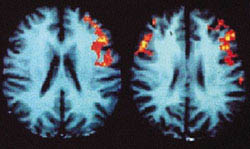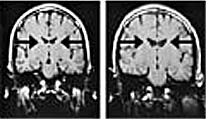
Current
research projects may be divided into these inter-linked areas:
Etiology of Working Memory and Attention Deficits in Schizophrenia
Cognitive Neuroscience of Social
Functions in Schizophrenia
Endophenotypic markers of schizophrenia and schizotypal personality
Neurocognitive
and Psychiatric Consequences of Cannabis Use
Back
to Lab Webpage
|
  
Overview
of our research programs
Our research program lies at the intersection between
biological psychiatry and cognitive neuroscience with developmental and
behavior genetics components. Our broad research goals are to specify and
understand neurobiological bases of psychoses and in doing so, to further
elucidate neural underpinnings of normal cognitive processes. Since early
1990s, we have focused on understanding the nature of cognitive deficits of
schizophrenia (e.g. deficits in working memory, attention, oculomotor control)
to elucidate the relationships among behavioral signs, brain abnormalities and
psychotic symptoms.
We work with observable and quantifiable behaviors
that can clearly differentiate patients with schizophrenia from healthy people
and we try to understand the neural origins and behavioral consequences of
these differences. Our earlier studies of working memory deficit in
schizophrenia have played a significant role in establishing cognitive symptoms
as core features of schizophrenia (e.g. Park & Holzman 1992, 1993; see
meta-analytic review in Lee & Park, 2005). These investigations led to a
deep interest in identifying components and etiology of core cognitive symptoms
and associated endophenotypic markers of schizophrenia (e.g. Park, Holzman
& Goldman-Rakic, 1995; Park, Holzman & Lenzenweger, 1995; Park et al,
1999; Myles-Worsley & Park, 2002). Better understanding of cardinal
features of schizophrenia should lead to more effective pharmacological and
behavioral treatments. Moreover, specification of behavioral markers may help
us detect neurocognitive precursors of psychosis in young people at high-risk,
which should be very useful for developing effective intervention
strategies.
Our lab has been successful in building synergistic
collaborations with neuropharmacologists (Meltzer, Cowan, Sumiyoshi),
radiologists (Kessler, Riccardi), biophysicists (Anderson, Gore), developmental
psychologists (Hespos), social psychologists (Roese) and vision scientists
(Blake, Lappin). We utilize multiple methods and techniques to examine
components of memory, attention and social deficits in psychiatric patients
(cognitive neuropsychology, psychophysics, psychophysiology, fMRI,
near-infrared optical imaging, PET, DTI and neuropharmacology).
Since 1991, our research projects have been
continuously supported by grants from federal agencies (NIMH, NIDA, Swiss
National Science Foundation) and private foundations (NARSAD, Human Frontiers
of Science Program, Scottish Rite) and these grants have been instrumental in
training graduate and undergraduate students, medical students, post-doctoral
fellows and research assistants in psychology, neuroscience and psychiatry. We
have developed a strong and systematic research program in cognitive
neuroscience of psychiatric disorders and have trained and nurtured young
scientists who, in turn, go out to build their own research laboratories in
psychiatric neuroscience. In the next decade, we expect to grow further towards
understanding the etiology of schizophrenia, its developmental trajectory in pre-schizophrenic
adolescents and the individual differences in the phenotypic manifestation of
the disorder so that we may begin to implement intervention strategies and more
effective, tailored pharmacological and behavioral treatments.
|



